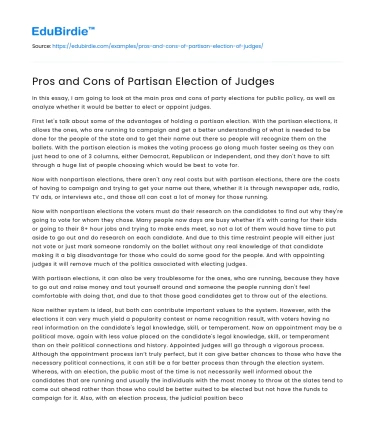In this essay, I am going to look at the main pros and cons of party elections for public policy, as well as analyze whether it would be better to elect or appoint judges.
First let's talk about some of the advantages of holding a partisan election. With the partisan elections, it allows the ones, who are running to campaign and get a better understanding of what is needed to be done for the people of the state and to get their name out there so people will recognize them on the ballets. With the partisan election is makes the voting process go along much faster seeing as they can just head to one of 3 columns, either Democrat, Republican or Independent, and they don't have to sift through a huge list of people choosing which would be best to vote for.
Save your time!
We can take care of your essay
- Proper editing and formatting
- Free revision, title page, and bibliography
- Flexible prices and money-back guarantee
Now with nonpartisan elections, there aren't any real costs but with partisan elections, there are the costs of having to campaign and trying to get your name out there, whether it is through newspaper ads, radio, TV ads, or interviews etc., and those all can cost a lot of money for those running.
Now with nonpartisan elections the voters must do their research on the candidates to find out why they're going to vote for whom they chose. Many people now days are busy whether it's with caring for their kids or going to their 8+ hour jobs and trying to make ends meet, so not a lot of them would have time to put aside to go out and do research on each candidate. And due to this time restraint people will either just not vote or just mark someone randomly on the ballet without any real knowledge of that candidate making it a big disadvantage for those who could do some good for the people. And with appointing judges it will remove much of the politics associated with electing judges.
With partisan elections, it can also be very troublesome for the ones, who are running, because they have to go out and raise money and tout yourself around and someone the people running don't feel comfortable with doing that, and due to that those good candidates get to throw out of the elections.
Now neither system is ideal, but both can contribute important values to the system. However, with the elections it can very much yield a popularity contest or name recognition result, with voters having no real information on the candidate's legal knowledge, skill, or temperament. Now an appointment may be a political move, again with less value placed on the candidate's legal knowledge, skill, or temperament than on their political connections and history. Appointed judges will go through a vigorous process. Although the appointment process isn’t truly perfect, but it can give better chances to those who have the necessary political connections, it can still be a far better process than through the election system. Whereas, with an election, the public most of the time is not necessarily well informed about the candidates that are running and usually the individuals with the most money to throw at the slates tend to come out ahead rather than those who could be better suited to be elected but not have the funds to campaign for it. Also, with an election process, the judicial position becomes politicized. Judicial candidates are often called upon to take positions on issues like abortion, gun control, the death penalty, etc., that judicial candidates should not ethically give.
Unless and until there is a method in which judicial elections are not politicized and a campaign limit is placed on the judicial electoral process, the appointment method is by far better suited for the process in which we chose those who serve as judges.






 Stuck on your essay?
Stuck on your essay?

